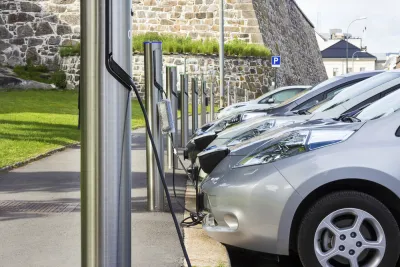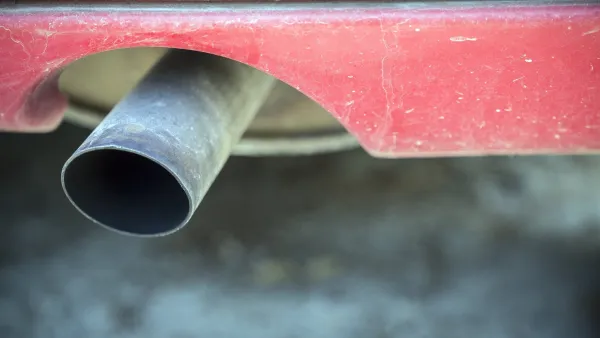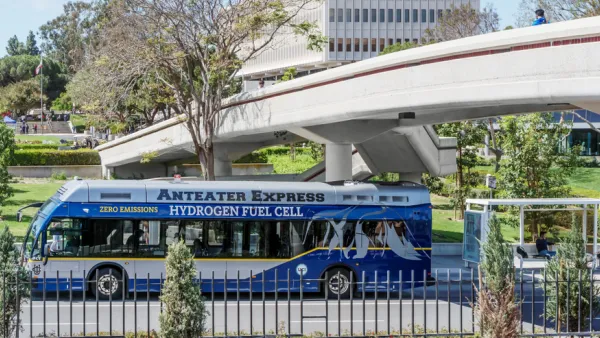According to a new report by the California Air Resources Board, even if electric vehicle sales were to increase tenfold, it would not reduce emissions from transportation enough to meet a 2030 climate goal. A major reduction in driving is needed.

The California Air Resources Board (CARB) announced in July that the state had achieved the steep carbon emissions reductions that were set in a landmark 2006 law – emissions had been reduced in 2016 to 1990 levels. However, there was also ominous news in the release of the 2016 greenhouse gas inventory. For the second consectuive year, transportation emissions had increased, accounting for 41 percent of all emissions.
That law, Assembly Bill 32, expires in 2020, and its replacement, Senate Bill 32, sets the bar much higher: reduction of greenhouse gases 40% below 1990 levels by 2030.
In order to meet that goal, "a major turnaround in the transportation sector" is required, according to a new report by CARB released Monday, reports Liam Dillon for the Los Angeles Times on Nov. 26.
Dramatically increasing the amount of electric vehicles on the road will not solve the problem, the report said. Even if new car sales of zero-emission vehicles increase nearly tenfold from today, the state would still need to reduce vehicle miles traveled per capita by 25% to meet the 2030 goal.
“California will not achieve the necessary greenhouse gas emissions reductions to meet mandates for 2030 and beyond without significant changes to how communities and transportation systems are planned, funded and built,” the report said.
The report, prepared for the legislature, is to discuss progress toward meeting the goals of the Sustainable Communities and Climate Protection Act of 2008 (SB 375), viewed as a landmark smart growth bill at the time. The law also "required regions across the state to plan for housing growth so that people could live closer to where they work or public transit and reduce their time on the state’s roadways," adds Dillon.
“If we are going to meet California’s bold climate goals, we must hold ourselves accountable,” said State Senator Ben Allen (D – Santa Monica), who authored the law (SB 150) requiring the report, writes Ella Wise for ClimatePlan.
“To do that effectively we need to understand our progress through active monitoring and real-time data and be ready to make the changes needed to get us on target,” adds Allen.
The legislation requires the report to include a discussion of best practices and challenges faced by the state's 18 metropolitan planning organizations (MPOs} in meeting their respective transportation emission-reduction targets approved by CARB.
Related in Planetizen:
-
Report: Transportation Emissions Sully California's Environmental Reputation, September 6, 2018
- California's Great Transportation Divide—Between Two Key Governmental Agencies, July 9, 2018
Hat tip to Darrell Clarke.
FULL STORY: California falling short on climate change goals because driving is increasing, report finds

National Parks Layoffs Will Cause Communities to Lose Billions
Thousands of essential park workers were laid off this week, just before the busy spring break season.

Retro-silient?: America’s First “Eco-burb,” The Woodlands Turns 50
A master-planned community north of Houston offers lessons on green infrastructure and resilient design, but falls short of its founder’s lofty affordability and walkability goals.

Delivering for America Plan Will Downgrade Mail Service in at Least 49.5 Percent of Zip Codes
Republican and Democrat lawmakers criticize the plan for its disproportionate negative impact on rural communities.

Test News Post 1
This is a summary

Test News Headline 46
Test for the image on the front page.

Balancing Bombs and Butterflies: How the National Guard Protects a Rare Species
The National Guard at Fort Indiantown Gap uses GIS technology and land management strategies to balance military training with conservation efforts, ensuring the survival of the rare eastern regal fritillary butterfly.
Urban Design for Planners 1: Software Tools
This six-course series explores essential urban design concepts using open source software and equips planners with the tools they need to participate fully in the urban design process.
Planning for Universal Design
Learn the tools for implementing Universal Design in planning regulations.
EMC Planning Group, Inc.
Planetizen
Planetizen
Mpact (formerly Rail~Volution)
Great Falls Development Authority, Inc.
HUDs Office of Policy Development and Research
NYU Wagner Graduate School of Public Service





























